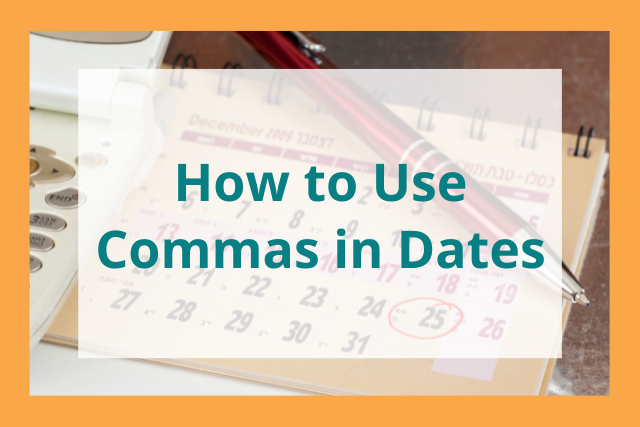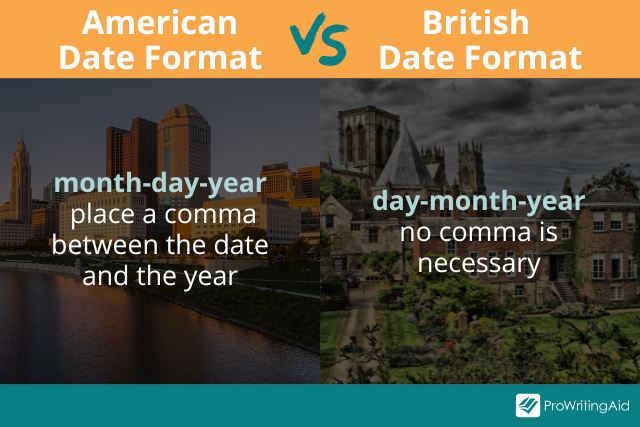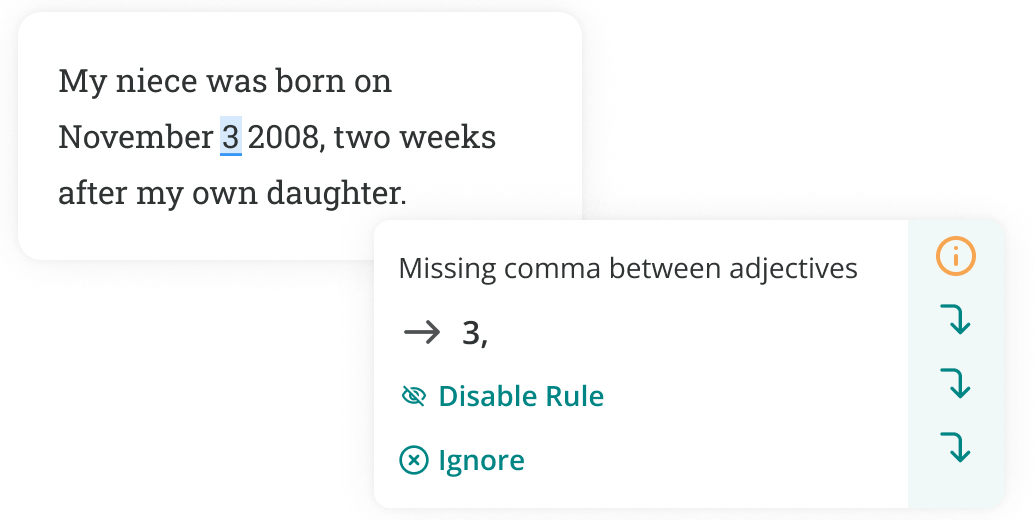
It can be confusing to remember when to use commas in dates, especially because not everyone uses the same date format!
In the American month–date–year format, a comma goes after the date. But in inverted style dates, you don’t need a comma.
Today, we’re taking a deep dive into how to use commas when you write dates.
Do You Need a Comma to Separate the Day from the Month?
Different styles of English have different ways of writing dates, and the comma rules change depending on the type of English.
The American format writes the month first, followed by the date, then the year if necessary. In this format, only place a comma after the date and before the year. If there’s no year, no comma is necessary.
- June 15, 1991
- June 19
However, the British style uses the date–month–year format. Do not put a comma between the date and the month in this format.
- 15 June 1991
- 19 June
These two rules apply to freestanding dates, like the examples above, as well as dates in sentences.
- I was born on June 15, 1991.
- My birthday is June 15.
- I was born on 15 June 1991.
- My birthday is 15 June.
You may sometimes use ordinal numbers when you write a date. When you do, the comma rules are the same. But if you say, for example, “the 15th of June,” don’t use a comma no matter which style of English you’re using.
- June 15th, 1991
- 15th June 1991
- I was born on the 15th of June 1991.
However, it’s best to avoid ordinal numbers in dates in formal writing.

Do You Need a Comma to Separate the Month from the Year?
You don’t need commas in dates when you only write the month and year, regardless of whether you’re using British or American English.
- June 1990
- They were born in June 1990.
When you use the ordinal number and “of” to write a date, you can place a comma after the month and before the year in a sentence, but it’s optional. Both of these examples are correct:
- She was born on the 15th of June 1991.
- She was born on the 15th of June, 1991.
Do You Need a Comma after the Day of the Week?
Sometimes, you might include the day of the week when you write a date. Whether you’re using month–day–year format or inverted dates, place a comma after the day of the week.
- Saturday, June 15, 1991
- Saturday, 15 June 1991
- She was born on Saturday, June 15, 1991.
- She was born on Saturday, 15 June 1991.
But if you use an ordinal number plus “the” and “of” for the date, you don’t need a comma after the day of the week. In other words, if you use “the,” don’t use a comma.
- Saturday the 15th of June
Do You Need a Comma after the Year in a Date?
Sometimes, the date appears in the middle of a sentence. If you’re writing the entire date, place a comma after the year in the American format.
- Her birth on June 15, 1991, was a cause for celebration.
You don’t need a comma after the year in the British format, unless the date is at the end of a dependent clause. Follow normal comma rules for dependent clauses.
- Her birth on 15 June 1991 was a cause for celebration.
- On 15 June 1991, she was born.
When you write just the month and the year, do not put a comma after the year in the middle of a sentence. This applies to both American English and British English.
- Her birth in June 1991 was a cause for celebration.
Did you know you can change the style of English in ProWritingAid? Don’t worry about remembering all the tricky differences between British and American English. Just change the language by clicking on the flag in your settings bar.
Examples of Commas in Dates in Sentences
Here are a few more examples of how to use commas in dates:
- Opening day for baseball always occurs near to April 1.
- On 6 June 1944, the Allies invaded France on the beaches of Normandy.
- President Franklin D. Roosevelt called December 7, 1941, a “day which will live in infamy.”
- Whose birthday is on December 25, 2000?
- Please complete the report by Monday, 17 October.
- I had tickets to see Alanis Morissette in July 2020.
- Our cruise leaves on Friday, November 4, 2022, from Galveston, TX.
In short, you’ll typically only use commas after the date or year in the American date format, not the British date format. But you should always use a comma after the day of the week, unless you’re using “the” + ordinal number.

Commas don’t have to be tricky. Avoid missing and misplaced commas in dates by using our free grammar checker.


